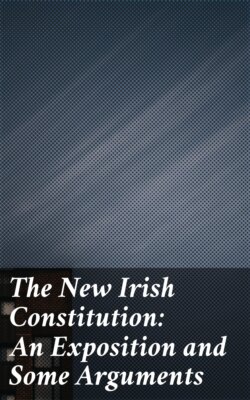Читать книгу The New Irish Constitution: An Exposition and Some Arguments - Various - Страница 9
На сайте Литреса книга снята с продажи.
The Executive Veto.
ОглавлениеTable of Contents
It is obvious, therefore, that the principal and indeed almost the only safeguard provided in the Bill against inequitable or discriminating legislation38 is the veto of the Lord-Lieutenant acting on the instructions of the Imperial Government. A political check is preferred to a juristic check. The apostolic maxim “all things are lawful but all things are not expedient,” appears to have been the motto of the draughtsman. Not law but policy will decide what Irish Acts are to be placed on the Statute-Book. It must be admitted that this is the principle most in harmony with precedent if the constitutions granted to the colonies are to be regarded as precedents. No colony would have tolerated for a moment the elaborate network of restrictions in Clause 4 of the Bill of 1893, through the finely-woven meshes of which it would have been hard for any Irish legislation of an original or experimental character to pass. If we are really in earnest about setting up a Parliament on College Green, we cannot do otherwise. The executive veto must be the real check, and in the presence of such a check, English judges would always be very loath39 to declare the Acts of a legislature ultra vires merely because they infringed common law rights.
Now this check may be exercised on one of two grounds. The Imperial Government may “instruct” the Lord-Lieutenant to refuse his assent either on the ground that the bill in question is politically objectionable, or on the ground that it is, in their opinion, in [pg 026] excess of the powers conferred on the Irish Legislature. It is desirable in every way that the two should be distinguished in order that the Imperial Parliament may be able to hold the Cabinet of the day responsible when its action is purely a question of policy. On the other hand, it is no less desirable that the Cabinet should, in the interests of the public in Ireland, be in a position to test the validity of an Irish Bill which, though unobjectionable on the ground of policy, may be questionable on the ground of law. It is a common error that in all written constitutions the courts, particularly those of the United States, have proprio motu the power of declaring ultra vires any legislative act which infringes the principles of the Constitution. Laboulaye fell into this error in his study of the American Constitution. But the American Courts have no such power. Until a case arises in the ordinary course of litigation, under the statute in question, there is no means of annulling it, and there have been many Acts40 on the Federal Statute Book which are quite conceivably “unconstitutional” in the letter as well as in the spirit, but have never been declared ultra vires for the simple reason that no one has found his private rights affected. This holds particulars of questions of the distribution of power. It might for example, occur in the case of an Irish Bill which proposed to deal with one of the reserved services. To meet this difficulty and to avoid the trouble which might arise from an Act being placed in the Irish Statute Book41 and observed in Ireland only to be subsequently declared ultra vires in the course of litigation, it is [pg 027] provided in the Government of Ireland Bill42 (Clause 29) that if it appears to the Lord-Lieutenant or a Secretary of State expedient in the public interest that the validity of an Irish Act should be tested he may represent the same to His Majesty in Council and the question may then be heard and determined by the Judicial Committee in the same manner as an appeal from a Court in Ireland. It is not necessary to suppose that the executive veto will be a dead letter, and to argue from its disuse in the case of the self-governing colonies is to argue from the like to the unlike. In the case of the provincial legislatures of Canada it has been exercised by the Dominion Government where provincial legislation is inequitable, or contrary to “the settled policy” of the Dominion.
